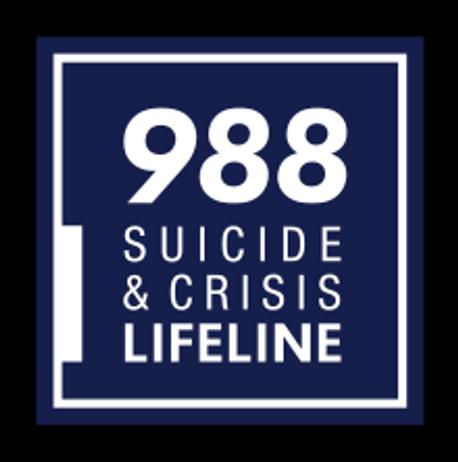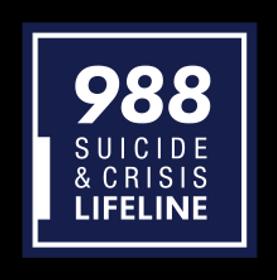The nation got a new Suicide Hotline on July 16, 2022. All somebody has to do is dial 988 to speak with a trained counselor.
988 has been designated as the new three-digit dialing code that will route callers to the National Suicide Prevention Lifeline (now known as the 988 Suicide & Crisis Lifeline), and is now active across the United States. When people call, text, or chat 988, they will be connected to trained counselors that are part of the existing Lifeline network. These trained counselors will listen, understand how their problems are affecting them, provide support, and connect them to resources if necessary. Source: 988 Suicide and Crisis Lifeline
Before we discuss suicide in more detail, please print out the logo above and pin it to your kitchen noticeboard. Then, tell your children what 988 is and what it is used for, so they can help somebody in need the same way they do by knowing how and when to call 911.
This video explains how the 988 suicide and crisis lifeline number works.
Suicide: The Subject Nobody Wants To Talk About
Suicide knows no age limits. It is shocking and tragic no matter how or when it occurs. It scatters guilt widely as the friends and loved ones of the deceased wonder what they could have done to prevent somebody from taking her life. What subtle warning signs did they miss? The "if only's" haunt those left behind. If only they had been more friendly, if only they had been more involved, if only they had told somebody about warning signs they had observed.
It's not easy to talk about suicide. You'll clear a room in any social setting when you mention suicide. But it's important to talk about it. First of all, seek professional help if someone you know has died by suicide. Work through your feelings. Take care of yourself. Then you will be able to take care of others.
Know the Warning Signs.
Every year there are reports of high school students taking their own lives. Suicide casts a terrible pall over any school community. It just seems so pointless, so senseless. If only community members had acted on the signals that the victim was most likely sending, that suicide could have been prevented.
The high school academic workload can be heavy as students prepare for college admissions, particularly in the sophomore and junior years. Advanced Placement examinations and International Baccalaureate Diploma requirements add to the pressure. Earning the best grades, getting into the best college, and not disappointing family and friends combined with the reality of adolescent uncertainties can create a climate for worry and depression. Depression can lead to suicide. But suicide is preventable.
Suicide is preventable.
Suicide is the 3rd largest killer of young adults between the ages of 15-24. But teen suicide is preventable. But, first, you need to know the warning signs.
The following information from Kids Health tells you what to look for.
"Suicide among teens often happens after a stressful life event, such as problems at school, a breakup with a boyfriend or girlfriend, the death of a loved one, a divorce, or a major family conflict.
Johns Hopkins Medicine offers the following warning signs of teen suicide.
Many of the warning signs of suicide are also symptoms of depression. They are:
- Changes in eating and sleeping habits
- Loss of interest in usual activities
- Withdrawal from friends and family members
- Acting-out behaviors and running away
- Alcohol and drug use
- Neglecting one's personal appearance
- Unnecessary risk-taking
- Obsession with death and dying
- More physical complaints often linked to emotional distress, such as stomachaches, headaches, and extreme tiredness (fatigue)
- Loss of interest in school or schoolwork
- Feeling bored
- Problems focusing
- Feeling he or she wants to die.
- Lack of response to praise
Source: What is suicide? Johns Hopkins Medicine
Triggers
Seemingly ordinary life events such as going off to college, divorce, or the death of a family member or other loved one can be the triggers that prompt a young person already thinking about suicide to actually follow through. In their mind, suicide is a solution to their problems, the ultimate escape.
Parents: Talk about suicide
As a parent, you need to spend quality time with your child. Listen to him. Don't talk at him. Share your experiences and feelings. Be available. Keep firearms and other weapons securely locked. Control and monitor your child's use of social media. TikTok, for example, will expose your child to an unlimited amount of viewpoints and just plain dangerous stuff in a heartbeat. Teach your child to analyze what she sees, hears, and reads. Teach her how to think critically. Don't leave that task to the school.
Healthy Children offers 10 Things Parents Can Do to Prevent suicide. I quote their 10 points below.
- Don't let your teen's depression or anxiety snowball.
- Listen—even when your teen is not talking.
- Never shrug off threats of suicide as typical teenage melodrama.
- Seek professional help right away.
- Share your feelings.
- Encourage your teen not to isolate himself or herself from family and friends.
- Recommend exercise.
- Urge your teen not to demand too much of himself or herself.
- Remind your teen who is undergoing treatment not to expect immediate results.
- If you keep guns at home, store them safely or move all firearms elsewhere until the crisis has passed.
As a student, you must know what is happening with your peers. Take it seriously if you notice somebody acting strangely or talking about ending her life. Get help.
This TEDMed talk offers a simple powerful to prevent teen suicide.
Teachers: Talk About Suicide
As a teacher, you should do the following:
• Understand why suicide prevention is important
• Identify students who may be at risk for suicide
• Respond to students who may be at risk for suicide
• Be prepared to respond to a suicide death
• Consider becoming involved in schoolwide suicide prevention
Source: Suicide Prevention Resource Center
As an administrator, you need to promote awareness of suicide. You need to hold training for suicide prevention proactively. Create 24/7 access to an anonymous suicide hotline. Offer help and counseling. Above all, do not stigmatize students or staff for reporting information. The National Association of School Psychologists offers advice and guidance on structuring suicide prevention training for your staff.
Suicide is preventable. But the school community needs to help prevent it.
Questions. Contact us on Facebook. @privateschoolreview
























